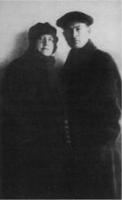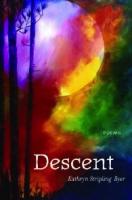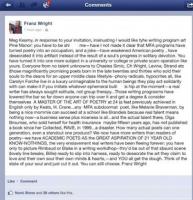November 20, 2012
Edited by David Sanders
Specimen Days
November 20, 2012
1752 – Thomas Chatterton, English poet (Christabel), is born.
1960 – Jacob Cohen, Hebrew poet/writer, dies.
1972 – Sheema Kalbasi, Iranian-born poet, is born.
1978 – Vasilisk Gnedov, Russian poet (b. 1890), dies.
1994 – Saeedi Sirjani, poet, dies at 64.
2005 – Manouchehr Atashi, Iranian poet (b. 1931), dies.
 Poem of the Beginning (white)
Poem of the Beginning (white)
Darkness births the stars,
Stars give birth to silence.
The month is born in fables,
Fables – tormentors of love.
…
We tore the thread and are sewing a net…
We’ll tie up the loose thread,
Like the white wind that binds our hair!
—Vasilisk Gnedov, 1890–1972
Poetry In The News
Michael Gove Backs Study of “French Lesbian Poetry”
The Education Secretary has accused Sir James Dyson of anti-intellectual bias following an attack on teenagers who choose to study “French lesbian poetry” at university. Michael Gove said the inventor was part of an “anti-intellectual strain in British life” which appeared to be biased against the accumulation of knowledge as a personal good. Read more at the Telegraph.
“Tar” with James Franco Is A Dreamy Collage of Pretty but Overfamiliar Aesthetics

It’s difficult to know quite what to make of “Tar,” a multi-authored project seemingly coaxed into being by the sheer force of James Franco’s current artistic cachet. Playing In Competition in the XXI sidebar of the Rome Film Festival, the film represents the work of twelve newbie directors— NYU film students all— and attempts to create an impressionistic interpretation of the work of poet C.K. Williams, who himself appears occasionally, reading from his collection. Read more at IndieWire.
World Poetry
What Now for Carlos Drummond de Andrade, Brazil’s National Poet?
“Poetry is everything, including the Creator of everything. Poetry is God,” said Ernesto Cardenal on Thursday after receiving from the hands of Spain’s queen the Queen Sofia Ibero-American Poetry Award at a ceremony held at the Royal Palace. Read more at Latino Fox News.
New Books
Salt Pier by Dore Kiesselbach

[Paperback] University of Pittsburgh Press, 88 pp., $15.95
Salt Pier is a love story. Seeking its bearings in the “natural” world, it follows an initially alienated and self-alienated speaker along a developmental path that begins in childhood and ends in a negotiated compromise with history that allows him to know loving companionship. It is not embarrassed of its straightforward structure anymore than it is ashamed of its mostly uncomplicated diction or its occasional, fairly explicit use of meter and rhyme. Although not shy of difficulty, it stands against subjectlessness and pro forma complexity in contemporary verse.
Nostalgia, My Enemy: Poems by Saadi Youssef
[Paperback] Graywolf Press, 96 pp., $15.00
This book collects some of the best of Saadi Youssef’s most recent poems from the last decade, since the ongoing American-led war in his home country of Iraq. In direct, penetrating language, translated from the original Arabic by Sinan Antoon and Peter Money, Youssef’s poems dwell on the casualties of the war, the loss of his country, the role of the writer in exile, the atrocities of Saddam Hussein, and the inhumane acts perpetrated by American military at Abu Ghraib. What emerges is the powerful voice of a writer for whom “Poetry transforms in that intimate moment which combines the current and the eternal in a wondrous embrace.”
Looking Up: Poems from the National Cathedral Gargoyles by Jeff Sypeck
[Paperback] lulu.com, 138 pp., $14.00
From light verse and straightforward sonnets to strange soliloquies and songs, Looking Up gives voice to the stony figures that adorn Washington National Cathedral—the beasts, fiends, and sentinels that watch us as we pass unknowingly beneath them. Proceeds from this book will benefit Washington National Cathedral’s earthquake repair fund.
Faster Than Light: New and Selected Poems, 1996-2011 by Marilyn Nelson
[Paperback] Louisiana State University Press, 176 pp., $19.95
Conjuring numerous voices and characters across oceans and centuries, Faster Than Light explores widely disparate experiences through the lens of traditional poetic forms. This volume contains a selection of Marilyn Nelson’s new and uncollected poems as well as work from each of her lyric histories of eighteenth-, nineteenth-, and twentieth-century African American individuals and communities, and The Cachoeira Tales, a long riff on Chaucer’s Canterbury Tales.
Descent: Poems by Kathryn Stripling Byer

[Paperback] Louisiana State University Press, 68 pp., $17.95
Navigating the dangerous currents of family and race, Kathryn Stripling Byer’s sixth poetry collection confronts the legacy of southern memory and landscape, where too often ”it’s safer to stay blind.”. . . Ultimately, Descent creates a fragile reconciliation between past and present, calling over and over again to celebrate being, as in the book’s closing manifesto, ”Here. Where I am.”
Recent Reviews
This Isa Nice Neighborhood Review
by Mary Austin Speaker
I was first introduced to Farid Matuk’s poetry when he gave a reading in the winter of 2010 at St. Mark’s Poetry Project in New York. The lines I carried away from Matuk’s reading, “I dress in the styles / of the rich / feel safe” appear in the final poem of his first book, This Isa Nice Neighborhood (Letter Machine Editions 2010), and grew steadily to stand in for a performance of wealth that had troubled me as a barely-cognizant Texan teenager back in the mid-90s. I knew that Matuk and his partner, poet Susan Briante, had moved to Dallas and taught very close to where I went to high school, but I was not prepared to hear poems that codified so exactly the private experience of life amid the tricked-out convertibles and ranch houses of the North Dallas suburbs. Read more at Painted Bride Quarterly.
The Gestural Lyric and Beyond

by Barry Schwabsky
Amy King’s poems are written from a place without an overview. The opposite of Olympian, this poetry is down here with the rest of us, mired in the details, some of which may be tedious while others astonish — a poetry just trying to keep its head in the air, mainly for survival’s sake. Read more at Jacket 2.
25 Points: All the Garbage of the World Unite!
by Janice Lee
1. To be clear, this book, and all of Kim Hyesoon’s books, are tainted by my mother’s death. Read more at HTML Giant.
Notes on Xi Chuan’s Notes on the Mosquito: Selected Poems
by Greer Mansfield
Xi Chuan has been famous in China (and not just in China) since the 1980s. Until this year, however, there have been no book-length English translations of his poetry. So reading this new career survey from New Directions and translator Lucas Klein, Notes on the Mosquito: Selected Poems, feels like discovering a strange and exhilarating new region of world poetry. Read more at Bookslut.
Correspondences
A Few Words on James Schuyler

by William Corbett
A first-time reader of James Schuyler’s poetry could have written my notes for this essay:
Clarity
Loves a list
Letter / diary
Right now, right here
Weather and Light
Addresses, exact addresses
Names of friends
Yet I spent thirteen years editing Schuyler’s letters, years during which I thought of him at least once a day, and at every reading I have given in the past decade or more I read at least one of his poems. Really, I ought to be able to come up with a few new observations about his exceptional poetry. Read more at Jacket 2.
Post-Election Prescription: A Generous Dose of Robert Bly

by Jennifer Nix
A person moves toward poetry out of need, says Robert Bly, when religious instruction perhaps fails to resonate deeply enough, or when trying to get in touch with one’s senses. This was certainly true for me, as I faced a devastating medical diagnosis and forged a path back to health. Poetry continues to guide and inspire me, and a few months ago even led to work on Haydn Reiss’s new film-in-progress, Robert Bly: News of the Universe. Read more at the Huffington Post.
A Natural Poet
Earthly delights in the shade of Robert Frost.
by Ann Stapleton
It might be argued that every American poet labors in the shadow of Robert Frost’s birches. But the difficulty is particularly acute in the case of Robert Francis (1901-1987), a “poet’s poet”—that double–edged designation—best known for his masterly lyric poems (eight books in all, including his Collected Poems 1936-1976 and his final volume, Late Fire, Late Snow). Referred to by Frost as “the best neglected poet,” he was constantly compared to his Amherst neighbor and mentor, with whom he could not help sharing a landscape both regional and artistic. Read more at the Weekly Standard.
Broadsides
On the Strict Separation of Literature and Politics
by D. G. Myers
The dream of “pure poetry” has beguiled those who would remove literature from the blaring disorderly world, and those who would emasculate it, for nearly a century. The term was first introduced by Paul Valéry, who meant simply that poetry should not try to do what history and philosophy can do better, but it fell to the critic Henri Bremond to popularize the concept. Read more at A Commonplace Blog.
Postscript: Jack Gilbert, 1925–2012

by Alice Quinn
Since Jack Gilbert died, on November 11th, friends have written to me of their passion for his work and of the big string of his poems that ran in The New Yorker in 2004 and 2005. I was late catching up to his work, too, in spite of my exposure to it. I was at Knopf when Gordon Lish published Jack’s second book of poetry, Monolithos, in 1982. At the time I didn’t peer into the book deeply enough to be captivated by the poems as I later decisively would be. Perhaps I was a little jealous— Gordon had obviously landed a big fish. Read more at the New Yorker.
by Alexander Nazaryan
Most of us simply ignore the countless invitations and solicitations we receive on Facebook. Firmly not in this group is Pulitzer Prize-winning poet Franz Wright, who was apparently the recipient of an invitation from Meg Kearney to the low residency MFA program at Pine Manor College in Massachusetts, where Kearney teaches.
Read more at the New York Daily News.
Drafts & Fragments
Franz Wright Lets Fly an Epic Facebook Rant on the State of Poetry

by Alexander Nazaryan
Most of us simply ignore the countless invitations and solicitations we receive on Facebook. Firmly not in this group is Pulitzer Prize-winning poet Franz Wright, who was apparently the recipient of an invitation from Meg Kearney to the low residency MFA program at Pine Manor College in Massachusetts, where Kearney teaches.
Read more at the New York Daily News.
Envoi: Editor’s Notes
Secrets of T. S. Eliot’s Tragic First Marriage and Liaisons to be Told at Last
Following the death of the poet’s widow, Valerie, a new biography has been mooted
by Vanessa Thorpe
The true creative impact of the mental decline of T. S. Eliot’s first wife, Vivienne, and the real nature of his abortive relationships with the women he saw following her committal to an asylum, along with other remaining mysteries of the renowned writer’s life, are finally likely to be held up to inspection by an official biographer. Read more at the Guardian.
I’m wonderin’. . . Does it matter what we know or don’t know about Eliot’s life as we read what he wrote? We who have read his poems in the blush of their first century knew something, but not the secrets of his letters or other private writings that have till now been withheld. For example, we know that “The Journey of the Magi” was informed by his conversion, but the poem is about what it is about, not necessarily about the poet. That would be a tremendous waste of time and energy if it were otherwise. By the same token, if Eliot didn’t want the future to know these “mysteries,” that he knew would eventually see the light of day, he had ample opportunity to destroy the evidence. So, I’m wonderin’. . . is it ironic that the man who saw poetry as an escape from personality might finally have his own poems seen through the very lens he seemed at pains to obscure?
—David Sanders